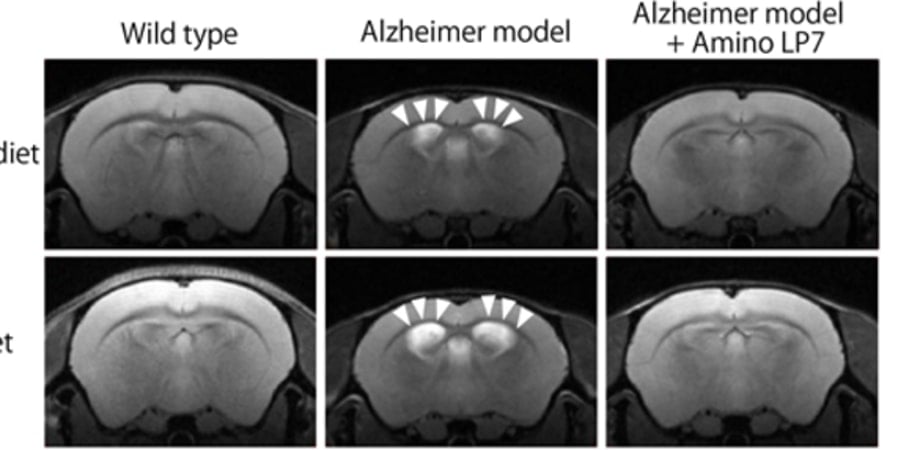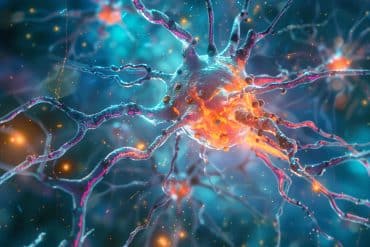Summary: While a low-protein diet can accelerate neurodegeneration, consuming Amino LP7, a combination of essential amino acids, could slow the progression or inhibit the development of dementia.
Source: The National Institutes for Quantum Science and Technology
Dementia—a condition involving the extreme loss of cognitive function—is caused by a variety of disorders, including Alzheimer’s disease. According to World Health Organization estimates, approximately 10 million individuals worldwide develop dementia every year, indicating the high psychological and social impact of this condition. Dementia mainly affects older people, and so far, simple and effective strategies for preventing this condition have remained elusive.
In a recent study published in Science Advances, Japanese researchers showed that a low protein diet can accelerate brain degeneration in mouse models of Alzheimer’s disease. More importantly, they found that Amino LP7—a supplement containing seven specific amino acids—can slow down brain degeneration and dementia development in these animals.
Their work expands on previous studies, which have demonstrated the effectiveness of Amino LP7 in improving cognitive function.
Dr. Makoto Higuchi from the National Institutes for Quantum Sciences and Technology, one of the lead scientists on the study, explains, “In older individuals, low protein diets are linked to poor maintenance of brain function. Amino acids are the building blocks of proteins. So, we wanted to understand whether supplementation with essential amino acids can protect the brains of older people from dementia, and if yes, what mechanisms would contribute to this protective effect.”
First, the researchers studied how a low protein diet affects the brain in mouse models of Alzheimer’s disease, which generally demonstrate neurodegeneration and abnormal protein aggregates called “Tau” aggregates in the brain.
They found that mice consuming a low protein diet not only showed accelerated brain degeneration but also had signs of poor neuronal connectivity. Interestingly, these effects were reversed after supplementation with Amino LP7, indicating that the combination of seven specific amino acids could inhibit brain damage.
Next, the research team examined how Amino LP7 affects different signs of brain degeneration in the Alzheimer’s model. Untreated mice showed high levels of progressive brain degeneration, but Amino LP7 treatment suppressed neuronal death and thereby reduced brain degeneration, even though the Tau aggregates remained.
According to Dr. Akihiko Kitamura, who also led this study, “Tau plaques in the brain are characteristic of Alzheimer’s and most treatments target them. However, we have shown that it is possible to overcome this Tau deposition and prevent brain atrophy via supplementation with Amino LP7.”
Next, to understand how Amino LP7 protects the brain, the researchers comprehensively analyzed the gene-level changes induced by Amino LP7. Their findings were quite encouraging.

They observed that Amino LP7 reduces brain inflammation and also prevents kynurenine, an inflammation inducer, from entering the brain, thereby preventing inflammatory immune cells from attacking neurons. They also found that Amino LP7 reduces neuronal death and improves neuronal connectivity, improving brain function.
“These results suggest that essential amino acids can help maintain balance in the brain and prevent brain deterioration. Our study is the first to report that specific amino acids can hinder the development of dementia,” say Dr. Hideaki Sato and Dr. Yuhei Takado, both of whom majorly contributed to the study.
“Although our study was performed in mice, it brings hope that amino acid intake could also modify the development of dementias in humans, including Alzheimer’s disease,” they add.
The study by this research group throws open several avenues for better understanding how dementias occur and how they can be prevented. Given that Amino LP7 improves brain function in older people without cognitive impairment, their findings suggest that it could also be effective in people with cognitive dysfunction.
Indeed, this patent-pending supplement could one day help millions worldwide live an improved, dementia-free life.
About this diet and dementia research news
Author: Masumi Nozato
Source: The National Institutes for Quantum Science and Technology
Contact: Masumi Nozato – The National Institutes for Quantum Science and Technology
Image: The image is credited to National Institutes for Quantum Science and Technology
Original Research: Open access.
“Neurodegenerative processes accelerated by protein malnutrition and decelerated by essential amino acids in a tauopathy mouse model” by Hideaki Sato, Yuhei Takado, Sakiko Toyoda, Masako Tsukamoto-Yasui, Keiichiro Minatohara, Hiroyuki Takuwa, Takuya Urushihata, Manami Takahashi, Masafumi Shimojo, Maiko Ono, Jun Maeda, Asumi Orihara, Naruhiko Sahara, Ichio Aoki, Sachise Karakawa, Muneki Isokawa, Noriko Kawasaki, Mika Kawasaki, Satoko Ueno, Mayuka Kanda, Mai Nishimura, Katsuya Suzuki, Akira Mitsui, Kenji Nagao, Akihiko Kitamura, Makoto Higuchi. Science Advances
Abstract
Neurodegenerative processes accelerated by protein malnutrition and decelerated by essential amino acids in a tauopathy mouse model
Protein malnutrition is epidemiologically suggested as a potential risk factor for senile dementia, although molecular mechanisms linking dietary proteins and amino acids to neurodegeneration remain unknown.
Here, we show that a low-protein diet resulted in down-regulated expression of synaptic components and a modest acceleration of brain atrophy in mice modeling neurodegenerative tauopathies. Notably, these abnormal phenotypes were robustly rescued by the administration of seven selected essential amino acids.
The up-regulation of inflammation-associated gene expression and progressive brain atrophy in the tauopathy model were profoundly suppressed by treatment with these essential amino acids without modifications of tau depositions. Moreover, the levels of kynurenine, an initiator of a pathway inducing neuroinflammatory gliosis and neurotoxicity in the brain, were lowered by treatment through inhibition of kynurenine uptake in the brain.
Our findings highlight the importance of specific amino acids as systemic mediators of brain homeostasis against neurodegenerative processes.






